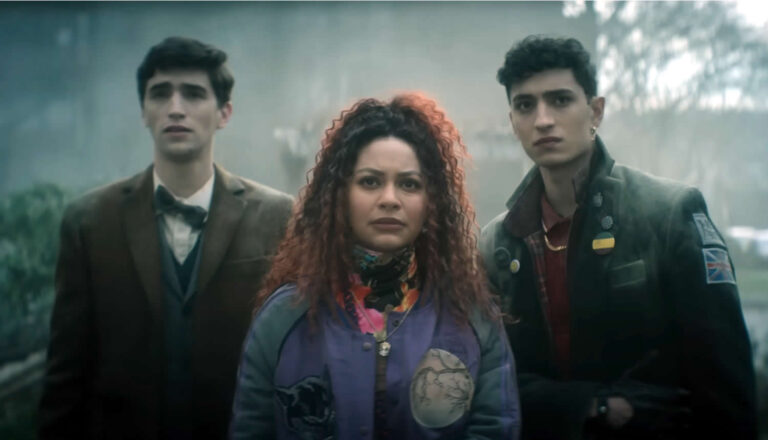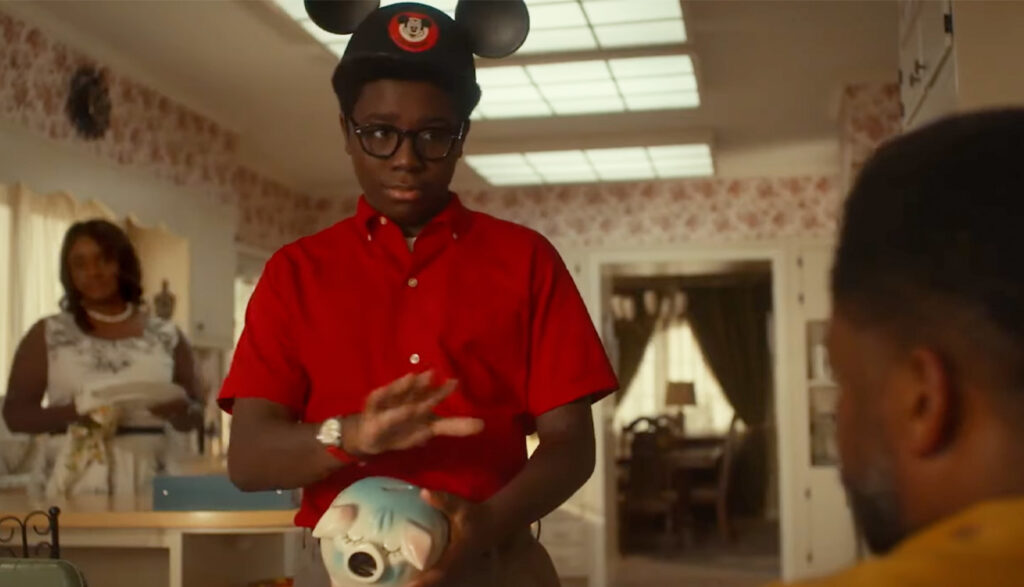
Dead Boy Detectives
Dead Boy Detectives targets teens in style and story. But it comes with very adult, problematic content.

Growing up is a wild ride, no matter where you are. Uptown or downtown, city or suburbs, being 12 is as exhilarating, as exhausting and as bewildering a time as there is.
Dean Williams is no different. But growing up Black in the late 1960s, well, that adds just a few extra bumps to that ride.
Dean isn’t popular like his sister (a high school queen and burgeoning young radical), not athletic like his brother (a soldier recently returned from Vietnam). Sure, he’s pretty smart, but it’s not like that’s going to earn you points in the halls of Jefferson Davis Junior High.
But for now, that’s OK. His mom and dad love him a lot—even if they’re tough on him, too. And while the family argues like any family, Dean swears that “If you turned your head just right, it all just sounded like music.”
And he’s got good friends. Cory’s already plowing his way through puberty, but he still sits with Dean on the bus. Brad, a quirky Jewish kid at their desegregated school, is “Pee Wee Reese to my Jackie Robinson.” Or, at least, he would be if either of them could catch a fly ball.
But Keisa is something else. Strong, pretty and enamored by comic books, Keisa has been Dean’s best friend for years. And Dean harbored a crush on her for quite some time, even after she got a boyfriend. Unfortunately, when Keisa realized she felt the same way toward Dean, she cheated on said boyfriend with Dean. And then later, she breaks up with both boys after realizing she isn’t ready to handle a relationship with anyone. But what would adolescence be without a taste of lovelorn angst?
If Dean’s world seems stable, though, the world outside is rocking on its axis. Social and racial issues are never far from the playground or dinner table. His parents sometimes have different philosophies on how to deal with those issues. And as comfortable and familiar as the Williams’ living room often is, the evening’s nightly news can sometimes barge in and touch everyone on the couch.
Dean’s childhood encompasses, indeed, years full of wonder. But you know what? Those years can be full of heartbreak and uncertainty and even a little bit of terror, too.
A professor once told me that your best stories—the experiences that make you who you are—all come before you hit 13. There’s some truth to that, I think. When you’re a tween—not a little kid anymore, but still a ways from adulthood—the world unfolds like an origami puzzle, with each fold unspooling a new sensation or secret. Your parents become real people. You start noticing the wider world in new ways. You begin thinking about your future. And maybe, you fall in love for the first time (or, at least, you think you do).
That’s what made the original Wonder Years, which ran on ABC for six seasons, such a nostalgic delight for so many. And this new Wonder Years is a worthy successor.
The latest Wonder Years isn’t a reboot. The Williams aren’t just a different race than the original Arnolds: They’re all really different people, and that makes 2021’s Wonder Years fresh and new. Outside the name, the only thing that migrated from one show to the other is the helpful narration (in this case done by Oscar-winner Don Cheadle).
No, check that: The vibe is the same, if that makes sense. This show maintains the honesty of what it feels like to grow up, albeit one softened and brightened by time and experience. Even though Dean is growing up in a very different context than the original Wonder Years’ Kevin Arnold—and the show takes pains to illustrate how different—they’ve got a lot in common, too. It reminds viewers that no matter the neighborhood we grow up in, we share a lot.
The new Wonder Years might be just a touch crasser than its forebear. We hear references to drugs and alcohol. There’s also a lot of sexual allusions that go right over Dean’s head (such as when he befriends a man who prefers to wear dresses). And some difficult cultural issues, from Vietnam to racial unrest, are huge factors in the show. Some of those racial elements—such as when Dean’s dad, Bill, is stopped by police—can feel all-too current and uncomfortable.
But the show also feels refreshingly innocent (in keeping with its 12-year-old protagonist) and quite sweet. This is truly a family show that feels both real and aspirational. Dean’s parents are far from perfect. But do they love Dean? Absolutely. Do they want what’s best for him? Positively. And will they make him work to reach his potential? You bet they will. And anytime we see a strong family at work on television, that’s a wonderful thing.
Dean spends the summer in New York with his dad, Bill, while Bill tries to sell a song to Marvin Gaye.
Dean’s mom, Lillian, offers to send her husband a “boudoir” photo while he’s in New York (and we later see a picture of her in a racy nightgown). Narrator Dean compares this to sexting. (He also notes that it was harder for sexual harassers to say they didn’t mean to send unsolicited pictures this way.) A woman worries she’ll have to marry another woman if she gets sent to prison.
Dean is shocked and stares when he sees a man wearing a dress for the first time. Later, the man, Lonnie, befriends Bill and Dean and explains that he performs in drag. It goes over Dean’s head, but it’s implied Lonnie was harassed in Alabama for wearing women’s clothes. And Lonnie beats up some guys offscreen after they heckle him for wearing men’s clothing.
We hear that women “didn’t have the right to choose,” referencing abortion, in 1969. We hear that a country is on the brink of war. Narrator Dean talks about two rats that ate another rat.
Bill makes an offhand remark that implies he doesn’t believe the government values Black lives as much as white ones.
There’s a joke about hiding liquor. Someone talks about making wine from plums (and steals some of the fruit from a stranger’s tree). We don’t see any drugs or cigarettes, but Marvin Gaye’s character is surrounded by smoke.
Lillian, Jackie (Lillian’s sister) and Kim (Lillian’s daughter), all get arrested when it’s discovered that Jackie stole a car from her boyfriend to get back at him for cheating on her. Later, we learn that Lillian was arrested once before for streaking (part of a sorority prank, she says).
Dean gets robbed by some kids in New York after sneaking out. A boy says he’ll urinate in the bushes. Some characters are quite rude. We learn that Jackie is a bit of a freeloader.
Lillian says the f-word (which is bleeped out) just after her sister mocks her for never swearing. We hear three uses of “d–n” and one misuse of God’s name.
Dean would really like to have his all-black baseball team take on the all-white team on which his friend, Brad, plays. But it’s not so easy to convince either his coach or his father. But while Dean eventually succeeds, the game is disrupted by a catastrophe.
We see a couple make out in a car. Another boy and girl kiss gently. We hear some allusions to pubic hair and talk about “wet dreams,” even though the people talking obviously have no idea what they even are. Dean’s parents (Bill and Lilian) dance and cuddle a bit, and Bill suggests that Dean’s baseball coach may be sweet on Lilian. (One reference is framed as a joke; he’s more serious later.)
Dean is beaten up by a bully at school, who accuses him of trying to be white. We see Dean get punched a couple of times and sink to the floor in pain. (The bully later steals a bike.) Dean’s teacher makes a statement that could be seen as racist (though Brad insists it’s not, and older Dean, as the narrator, admits he was never altogether sure whether the teacher was racist or not.) Dean’s nearly beaned by a baseball (which Brad, again, reassures him is not the actions of a racist pitcher).
Bill tries to keep his family as segregated from white society as possible. We see he and his family stopped by police, and Bill apparently gave him “the police talk,” about how an African-American should conduct himself when stopped by an officer. Dean’s sister hides a picture of herself dressed in black and holding a shotgun. The assassination of Martin Luther King Jr., which takes place during the episode, is felt deeply throughout Dean’s neighborhood. (Bill and Dean’s baseball coach leave the TV reports to check up on a neighbor.)
When a fellow student bothers Keisa on the bus, Keisa gets him in a headlock, demanding her “propers.” We learn that Brad is Jewish. There’s a reference to Bill’s musical studio smelling funny after rehearsal (an allusion, of course, to smoking marijuana). Dean smashes a window with a rock. We see a flashback of someone getting shocked via electrical outlet. Lilian checks Dean’s eyes for “eye boogers.” Dean reminds Cory that he’s supposed to teach him how to French kiss using a pillow. There’s a profanity bleeped out. Characters also say “a–” and “h—” once each, as well as arguably misuse God’s name once.


Paul Asay has been part of the Plugged In staff since 2007, watching and reviewing roughly 15 quintillion movies and television shows. He’s written for a number of other publications, too, including Time, The Washington Post and Christianity Today. The author of several books, Paul loves to find spirituality in unexpected places, including popular entertainment, and he loves all things superhero. His vices include James Bond films, Mountain Dew and terrible B-grade movies. He’s married, has two children and a neurotic dog, runs marathons on occasion and hopes to someday own his own tuxedo. Feel free to follow him on Twitter @AsayPaul.

Emily studied film and writing when she was in college. And when she isn’t being way too competitive while playing board games, she enjoys food, sleep, and geeking out with her husband indulging in their “nerdoms,” which is the collective fan cultures of everything they love, such as Star Wars, Star Trek, Stargate and Lord of the Rings.

Dead Boy Detectives targets teens in style and story. But it comes with very adult, problematic content.

An elf mage contemplates on connection and regret as she watches her human friends grow old and pass away.